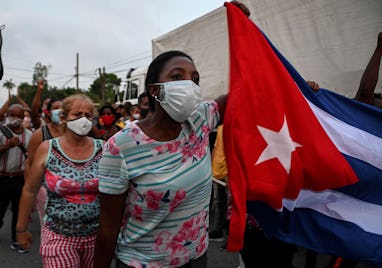Our Hearts Go Out to Anyone Who Has to Figure Out How to Talk About Cuba
Are you a tankie or an imperialist?

Protests in Cuba erupted on Sunday against the country’s government in response to hyperinflation and an urgent lack of resources, including food and medicine. These demonstrations, reportedly the largest in Cuba in decades, are springing forth amid an economic crisis sharpened by the COVID-19 pandemic, an end of the dual-currency system, and — a classic — the United States’ decadeslong embargo against the island country.
Perhaps on par with the suffering of the Cuban people, the protests are proving to be very difficult for Americans. It seems that they cannot figure out how to talk about them without stumbling onto any number of landmines: being accused of endorsing imperial powers’ attempts to destabilize the communist country, actually inadvertently siding with right-wing politicians who would love to destabilize the communist country, accidentally becoming bedfellows with tankies who swear allegiance to the state above all else.
For instance, let’s say you’d like to express solidarity with the Cuban people. Well, then you would be in the fine company of such luminaries as Sen. Marco Rubio, former Vice President Mike Pence, Reps. Dan Crenshaw and Lauren Boebert, the Daily Wire, and others who have constructed livelihoods out of slogans like “freedom” while having no problem with the U.S.-imposed sanctions or with other authoritarian figures I could name…
But wait, no, you might protest, not like that! Maybe you’re just a left-leaning person who believes in the expression of the people’s political will. Okay, well tell that to the people who believe that Cuban protesters and their supporters are all part of a CIA astroturfing campaign, that the quality of life in Cuba is better than it is here, or if not better, then it’s not an authoritarian state’s fault.
Well, you start to wonder, maybe they’re right. Maybe this is just another in a very long line of American meddling with Cuba and other communist nations it deems a threat. Okay sure, but why would you align yourself with any government? All governments are bad, even ones that call themselves revolutionaries while deploying soldiers and police to patrol the streets (yes, the U.S. does this too, remember when I said all governments are bad).
The problem, as with any political affair that does not just take place in black-and-white terms on Twitter, is that the protesters in Cuba — and, by extension, their overseas spectators, supporters, and naysayers — are not one uniform political mass, political historian Julio César Guanche Zaldívar writes for the Havana Times; there are right-wing Cubans, there are state-supporting leftists, there are regular people driven to desperation by economic austerity, there are opportunists looking to advance one agenda or another.
But the way we talk about politics now leaves little room for that ancient wisdom: multiple things can be true. You’re either a freedom-hating tankie or an imperialism-loving cop. Information and discourse are filtered through that binary. (This trap is probably why Rep. Alexandria Ocasio-Cortez and Sen. Bernie Sanders, the de facto avatars of socialism in the U.S., have not yet weighed in on Cuba as of publication time.) So what are we supposed to do? How are we supposed to talk about this? As always, it’s hard to be an American.